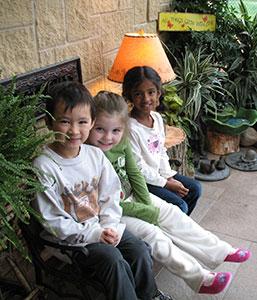
What is self-regulation and what does it have to do with your child’s development? Take a look at what you need to know about the early childhood period, this budding ability, and how the Montessori classroom can help your child to build self-regulation skills.
Self-Regulation Spans the Developmental Domains
Self-regulation isn’t one skill that your child will develop in one specific area. Instead, it’s an ability that spans all the developmental domains — cognitive, emotional, social, and physical. Each of the developmental domains are connected. This means skill-building in one area will often affect the other (or others).
As your child develops cognitive (intellectual and mental reasoning) abilities, you may notice an increase in their ability to self-regulate. You may also see increases in other areas, such as emotional and social development, as your child’s cognitive and self-regulatory areas change.
Likewise, you may start to notice an increase in your child’s ability to control physical or motor movements. In combination, these changes can help your child to focus, control their own actions, handle emotions in age-level appropriate ways, and interact with others responsibly.
Self-Regulation Won’t Happen at the Same Time for Every Child
At what age will your child develop the ability to self-regulate? This is a question many parents have. But there’s no clear-cut answer. While there is an expected progression for each area of development, some children may differ.
This isn’t always due to developmental delays or similar issues. Instead, the issue lies in each child’s individuality. Your preschooler’s best friend may have the ability to regulate their attention and focus for 15 minutes at a time, while your child may only sit still for 10 minutes. Differences don’t always signify a problem that requires attention or intervention. Instead, they represent the different ways each child grows and develops.
Even though your child may develop self-regulation skills somewhat differently than their friends (or like-aged children), you should still see a steady progression of increasingly complex or sophisticated abilities. This means your three-year-old may still lash out when they can’t find the right words or control their emotions. But by age five, you shouldn’t see the same level of meltdowns.
Self-Regulation Takes Time and Attention
Your child won’t develop this type of ability overnight. Along with time, self-regulation also takes practice. A high-quality early education program (and experienced, knowledgeable educators) can help your child to develop in each of the domains (cognitive, emotional, social, and physical). This type of early learning environment can also provide the perfect place to practice self-regulation skills and give your child the chance to control their own behaviors or actions.
If you’re not sure which type of early education setting is the best option to help your child build self-regulation abilities, consider the benefits of a Montessori school. Unlike traditional classrooms and programs, Montessori is grounded in a philosophy that is child-centered and individually-paced. Children take the lead in the learning process, gaining independence. As your child becomes an independent individual, they will also develop self-regulation skills.
Young children acquire some self-regulation skills by watching others model these behaviors. Not only will the Montessori teacher model these behaviors, but the multi-age classroom approach used in these schools gives your child the chance to see self-regulation in action. The older, more advanced students act as role models for the younger children. This helps to reinforce self-regulatory behaviors and skill development.
Beyond modeling, the Montessori classroom structure provides the warmth, responsiveness, and time for children to develop self-regulation on their own level and at their own pace.
Do you want to learn more about the Montessori philosophy? Contact Miniapple International Montessori School for more information.

